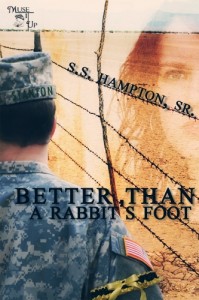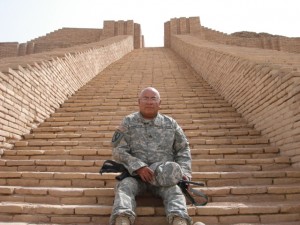I am very honored to welcome SS Hampton, Sr., a veteran and fellow Muser. He is the author of the short story Better Than a Rabbit’s Foot and is talking about writing and emotions. Welcome!
You know, writing might seem to require a split personality at times—no, I am not referring to writers with multiple pen names, which can be confusing enough.
Imagine writing an intensely emotional scene with one eye caught up in the scene and the emotion, while the other is coolly evaluating the magically appearing words and deciding whether the scene truly belongs in the story and if it is faithful to the emotions associated with the scene. And those thought processes are taking place at the same time. Sure, when you’re in the editing phase you can be logical and methodical, but when writing, is the emotion there that you can feel and relate to, and is it making its way into your manuscript? Or, are your carefully chosen words there but are empty and fail to convey the intensity of the emotions to the reader?
It can be difficult to do, I know.
As we all know, the best source for emotional inspiration is our own experiences—some wonderful and positive, some terrible and negative.
For example, do you remember how you felt the first Christmas with a brand new baby? Do you remember how the tiny eyes looked at the flashing lights and glittering tree ornaments? Maybe the baby was old enough to reach out a tiny hand toward the tree. (Curiosity in children is such a wonderful thing.) When my children were old enough to walk at Christmas they wanted to play with the shiny balls hanging from the tree almost as much as the family cat did. And we had to keep an eye on the baby as much as on the cat.
So, close your eyes for a moment. Replay those scenes. What emotions come to mind? What words would you use to describe that scene? Warmth? Joy? Love? Happiness? Do you feel warm all over? Are you smiling? Do you feel good, feel happy, regarding that memory and similar memories? Jot down what comes to mind and how you feel, before you forget.
However, there is always a reverse to the coin—sadness and anger. And when remembering these, it might be best to take a breather once the writing is done. These are powerful emotions too, just like love and happiness, but they are negative emotions.
Do you remember hearing of the death of a loved one, a friend, or someone you happen to know? Do you remember what emotions went through you? Shock? Sadness? Rage? Perhaps there was a proverbial “cold chill” that really did race through you, startle you, and make you tremble? Were your hands cold, clammy? Yes, it really is true that word of sudden death will send a cold chill through you. If woken up from sleep, you will find yourself wide awake. And later, in the quiet of the day or night, you will think of your own mortality. Someone you knew, close or not, who was once a living, breathing human being with dreams and hopes, is now gone—lifeless. Death comes for us all sooner or later, but upon receiving such news you will find that shadow uncomfortably closer to you.
As before, close your eyes for a moment and replay such scenes. Jot down the memory of emotions and physical sensations.
And more so than above, once you have finished writing scenes of sadness and anger, close the lid on such a Pandora’s box, take a break, take a deep breath, and enjoy the little things in life around you.
By the way, even if you’re a reader instead of a writer, you be sure to enjoy the little things in life around you too.
Better Than a Rabbit’s Foot blurb:
Sergeant Jerry Stanton is a young soldier serving in the War in Iraq. He is a gunner on a gun truck nicknamed “Lucky Bear,” one of those tireless workhorses that escort supply convoys from camps in Kuwait to destinations scattered throughout the war-torn country. In the early morning hours before a scheduled mission, a dust storm howls across his camp and threatens to bring convoy operations to a halt. Worse, the camp receives word that a gunner from his company was killed by an IED while on a convoy mission. Unlike most soldiers, Jerry doesn’t carry a lucky charm, but upon receiving news of the death of the gunner, he begins to mull over/ponder the merit/virtue of a good luck charm—only, what would work for him? Perhaps mail call will provide the answer.
You can purchase Better Than a Rabbit’s Foot at the MuseItUp bookstore, Amazon, and other ebook retailers.
Excerpt:
“People like a happy ending.”
Sergeant Jerry Stanton, an M4 Carbine slung across his chest, glanced at the dark form that trudged alongside him in the hot, early morning darkness. It was all the darker for the dust storm howling across the small camp, a dusty and sandy convoy support center, CSC, a mile south of the Iraqi border. He placed his hand over the tall styrofoam coffee cup from the messhall that was open at all hours to serve those about to head out on a mission. He felt the itchy dust filtering down his back, along his arms, and coating his fingers.
In spite of his short time deployed to Kuwait, he had learned that dust storms were worse than sand storms; they were hot and itchy while the sand storms stung exposed skin and chilled the air. Breakfast was good but tasted flat, more due to the question of whether their mission would be a go or no-go because of the storm that roared out of the midnight darkness hours before.
“What?”
“People like a happy ending,” the soldier repeated. He was a gunner from another gun truck as the squat, venerable M1114 HMMWVs, which were never meant to be combat vehicles, were called. He held up a rabbit foot that spun frantically in the wind and added, “I like a happy ending. Especially now.” They rounded the corner of a small building, actually a renovated mobile home trailer with a covered wooden porch lit by a bare electric bulb. The gunner pointed to a small black flag, suspended from a log overhang, flapping furiously in the wind.
“Oh shit.” Jerry sighed as a cold chill raced through him.
“It’s been there for an hour or so,” the soldier said as he enclosed the rabbit’s foot within both hands and brought it up to his lips as if to kiss it. He glanced at Jerry. “I’m not superstitious, but still, I mean, there’s nothing wrong with having a lucky charm. You know?”
“Yeah.” Jerry nodded as he watched the twisting flag. “I know.”
The soldier looked once more at the black flag and then walked toward the shower and restroom trailers beyond which were the air-conditioned sleeping tents they called home…
SS Hampton, Sr. is a full-blood Choctaw of the Choctaw Nation of Oklahoma, a divorced grandfather to 13 wonderful grandchildren, a published photographer and photojournalist, and a member of the Military Writers Society of America. He is a veteran with prior service in the active duty Army (1974-1985), the Army Individual Ready Reserve (1985-1995) (mobilized for the Persian Gulf War), and enlisted in the Army National Guard in October 2004, after which he was mobilized for Federal active duty for almost three years. Hampton is a veteran of Operations Noble Eagle (2004-2006) and Iraqi Freedom (2006-2007). On 1 July 2013 he retired from the Army National Guard with the rank of Sergeant First Class. His writings have appeared as stand-alone stories and in anthologies from Dark Opus Press, Edge Science Fiction & Fantasy, Melange Books, Musa Publishing, MuseItUp Publishing, Ravenous Romance, and as stand-alone stories in Horror Bound Magazine, The Harrow, and River Walk Journal, among others. Second-career goals include becoming a painter, and studying for a degree in photography and anthropology—hopefully to someday work in and photograph underwater archaeology. After 12 years of brown desert in the Southwest and overseas, he misses the Rocky Mountains, yellow aspens in the fall, running rivers, and a warm fireplace during snowy winters. In December 2011 in Las Vegas, Nevada, Hampton officially became a homeless Iraq War veteran.
You can find out more about SS and his stories at Melange Books, Musa Publishing, MuseItUp Publishing, his Amazon author page, his Amazon UK page, and his Goodreads page.






















Sound like a very intense and pertinent story for today’s world.
“Sounds”
Hi, Ann! It does…and LOL on the “sounds.” 🙂
Ann,
Thank you for the comment. The story, well, it is partially based on my own experience of being deployed 2006-2007. War really does have a way of uncovering one’s emotions, and sometimes putting emotions on paper can be difficult. Thank you for visiting. Have a great week!
Thanks, SS, for such a thought-provoking post!
Katie,
And this time let’s see if I can get the post to the appropriate person – thank you for this opportunity. I appreciate it.
🙂 You’re welcome!
Wow! What a blog, Stan! And the excerpt from your book was great as well.
Susan Bernhardt
http://www.susanbernhardt.com
Thanks for stopping by, Susan. Sorry it took so long for you comment to post…it ended up in with the spam comments somehow, but I saw it and saved it! 🙂
Susan,
Thanks for the comments; I appreciate it, and I’m glad you enjoyed the post. And thanks for visiting. Have a great week!
Great post. Emotions are key when you’re writing. You have to relive them to convey them well.
Love the excerpt. Sounds like such a powerful read.
Kelly,
Thank you for your comment. And thank you for visiting today. Have a great week.!
Very true, Kelly!
Great post! And thank you for your service, Stan. I really appreciate the sacrifice of all our soldiers. My husband mentioned awhile back maybe joining the National Guard and my first thought was- and be away from home? No way! =)
I agree, a big thanks to Stan for serving our country.
Leandra,
Thank you for your kind comments. I appreciate it. And I’m glad you liked the post. Thanks for visiting!
Stan, your writing is so crisp and realistic. You certainly take your own advice! Wonderful excerpt. All the best to you and Better Than a Rabbit’s Foot!
Pat,
Hi, and thanks for your kind comments. Thanks for visiting, and have a great week.
Hi, Pat…thanks for stopping by!
My pleasure, Katie. I love your blog!
Wonderful post! It’s definitely a good thing to keep emotions in mind while writing, and personal experience is the best source 🙂 I totally believe in taking a breather after though–it can be a trip!
Hi, Meradeth! A good breather after an emotional writing session is a very good thing.
Meradeth,
Hi. Thank you for your kind comments. I’m glad you liked the post. Thanks for visiting, and have a great week.